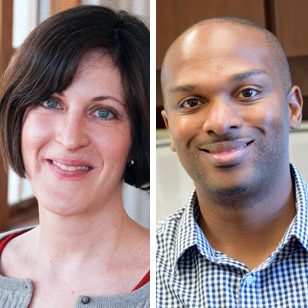
Selma Sabanovic (left) and Donald Williamson
Researchers from the Luddy School of Informatics, Computing, and Engineering will be included in the expansion of a collaboration between multiple academic institutions and the Toyota Research Institute to build and develop the understanding and application of artificial intelligence with a goal of achieving breakthroughs in automated driving, robotics, and machine assisted cognition.
Associate Professor of Informatics Selma Sabanovic, Assistant Professor Donald Williamson, Ph.D. candidate Swapna Joshi, and Waki Kamino, a master’s student in informatics, will lead Indiana University’s effort, which will use social robots to support community engagement and Ikigai—a Japanese concept that pertains to having a purpose in life—for older adults.
“It is really exciting to work with Toyota Research Institute and to start developing a collaboration with them that will hopefully inspire other compelling projects,” Sabanovic said. “This is a wonderful extension of all the work we’ve done previously in assistive robotics for older adults and cross-cultural research in the U.S. and Japan. It not only combines both of those research directions but also promises to develop usable solutions that help people reflect on and improve their wellbeing.
“In the long run, these robots should be able to assist other groups in similar tasks. In designing for everyday use by older adults—and in doing this cross-culturally across the US and Japan—we also hope to develop interaction capabilities for robots that will be adaptable to a wide variety of contexts and users, and that will be more widely usable.”
The Luddy study will use interviews and surveys to create a data collection pipeline, develop a unified measurement model, construct an ikigai model that can be personalized for individual users, and deploy social robots running the ikigai model in continuous interactions with users. The $1.5 million grant will allow research to be conducted over the next three years.
“My work in audio is geared towards applications that benefit society, such as older adults with hearing loss, so working on a project to develop measurement models for an older adult’s ikigai seemed like a perfect match,” Williamson said. “Receiving this award just reiterates how important it is to use technology to help others. I’m also extremely excited to be working with Toyota Research Institute. They have done a lot of interesting work thus far, and I’m glad to be a part of this venture.”
The Toyota Research Institute was founded in 2015 in collaboration with Stanford University, the Massachusetts Institute of Technology, and the University of Michigan to expand the body of research into artificial intelligence with the goal of amplifying the human experience. The next phase of the research is a five-year, $75 million expansion that includes the addition of 13 academic institutions.
“Our first five-year program pushed the boundaries of exploratory research across multiple fields, generating 69 patent applications and nearly 650 papers,” said Eric Krotkov, TRI Chief Science Officer who leads the university research program. “Our next five years are about pushing even further and doing so with a broader, more diverse set of stakeholders. To get to the best ideas, collaboration is critical. Our aim is to build a pipeline of new ideas from different perspectives and underrepresented voices that share our vision of using AI for human amplification and societal good.”
The Luddy School and IU will be joined by Carnegie Mellon University, Columbia University, Florida A&M University/Florida State University, Georgia Tech, Princeton University, Smith College, the Toyota Technological Institute at Chicago (TTIC), the University of California, Berkeley, the University of Illinois, the University of Minnesota, the University of Pennsylvania, and UCLA as part of the expansion.
“This is a substantial collaboration that will allow the Luddy School and its world-class researchers to take a critical leadership role in the continuously emerging field of artificial intelligence,” said Dennis Groth, interim dean of the Luddy School. “Improving lives through technology is a core mission of our school, and the research Selma, Donald, and their team are pursuing embody that mission. We’re proud to be a part of this effort with the Toyota Research Institute.”

